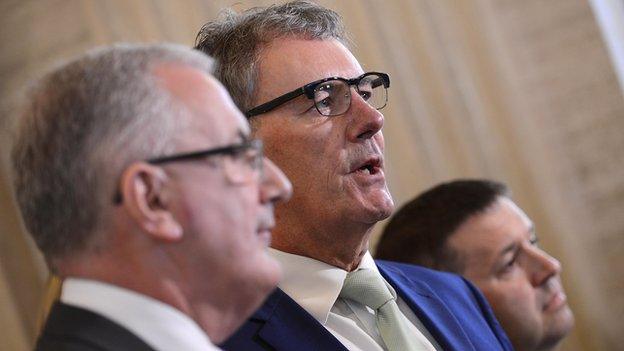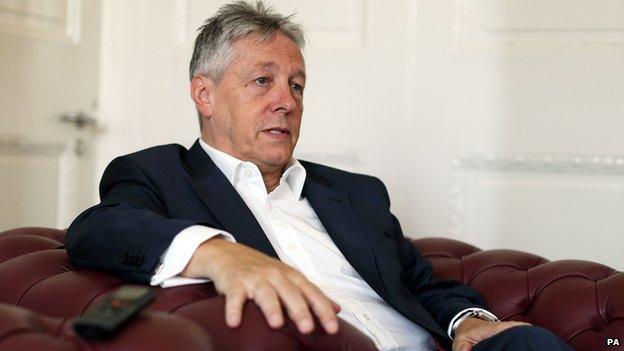Latest Stormont political crisis has 1990s time-warp feel
- Published
- comments

The consequences of Mike Nesbitt pulling the UUP out of government remain unclear
During the long months when the dark budget cloud hung over Stormont, the one silver lining it was possible to point to is that the nature of the problem - disagreement over welfare policy - showed how much the landscape had changed.
The parties were at loggerheads, but over social and economic issues, not paramilitaries and the border.
Not so the current crisis, that has the feel of a 1990s time-warp about it.
IRA activity, guns and government and unmasking the true identity of supposed anti-drugs vigilantes - we have seen it all before.
Last time, the pressure on the moderate Ulster Unionist Party (UUP) led to its eclipse by the hardline Democratic Unionist Party (DUP).
Intensive
Now we have a reversal of the roles.
The consequences of UUP leader Mike Nesbitt's bold gambit in pulling his party out of government remain unclear - some electoral advantage, probably, bolstering the UUP's comeback.
But is the DUP big enough to soak up the pressure with elections to the Northern Ireland Assembly not due until the spring?

Peter Robinson's has called for more "intensive" talks but there is scepticism over what they would achieve
After initially talking about excluding Sinn Féin from power, the DUP - with First Minister Peter Robinson back from leave - is focusing on holding yet more "intensive talks".
Given the failure to implement the Stormont House deal, there is room for scepticism about what fresh negotiations will achieve regarding the status of the IRA.
Stagger
Ideas in the ether include a return of the old Independent Monitoring Commission or the recall of some ex-IRA prisoners to jail.
Perhaps the renewed pressure on Sinn Féin over the IRA will change the party's calculations over the budgetary problems that have proved so hard to resolve.
Or perhaps post-Good Friday Agreement history will repeat itself and the power sharing coalition will prove unable to stagger on until next May's scheduled elections.
Sinn Féin's opponents in the Republic of Ireland have made the most of republicans' latest discomfiture, but the Irish government doesn't want to see a return to what Foreign Minister Charlie Flanagan described as "car crash politics" at Stormont.
Equally, David Cameron is unlikely to relish having to devote time and energy to a resumption of direct rule.
But London and Dublin better have their contingency plans ready in case the next proposed round of talks proves ultimately as unproductive as other recent negotiations.